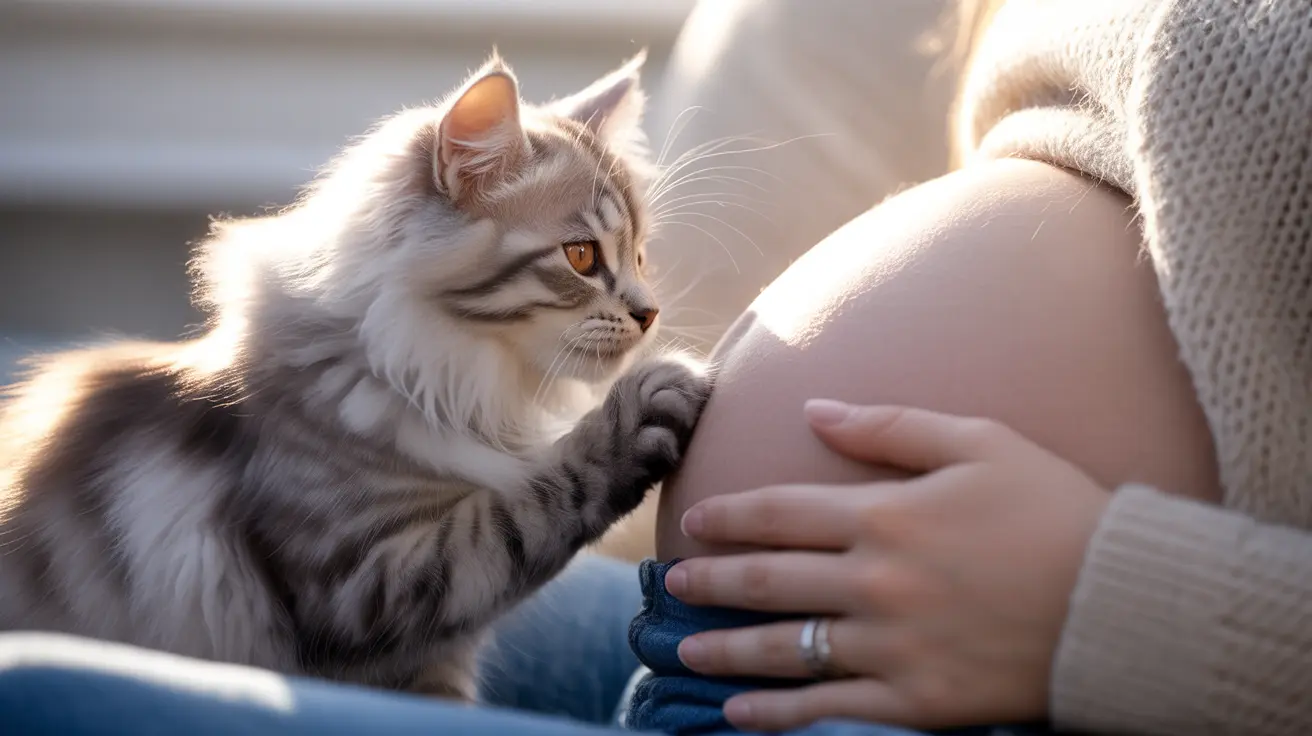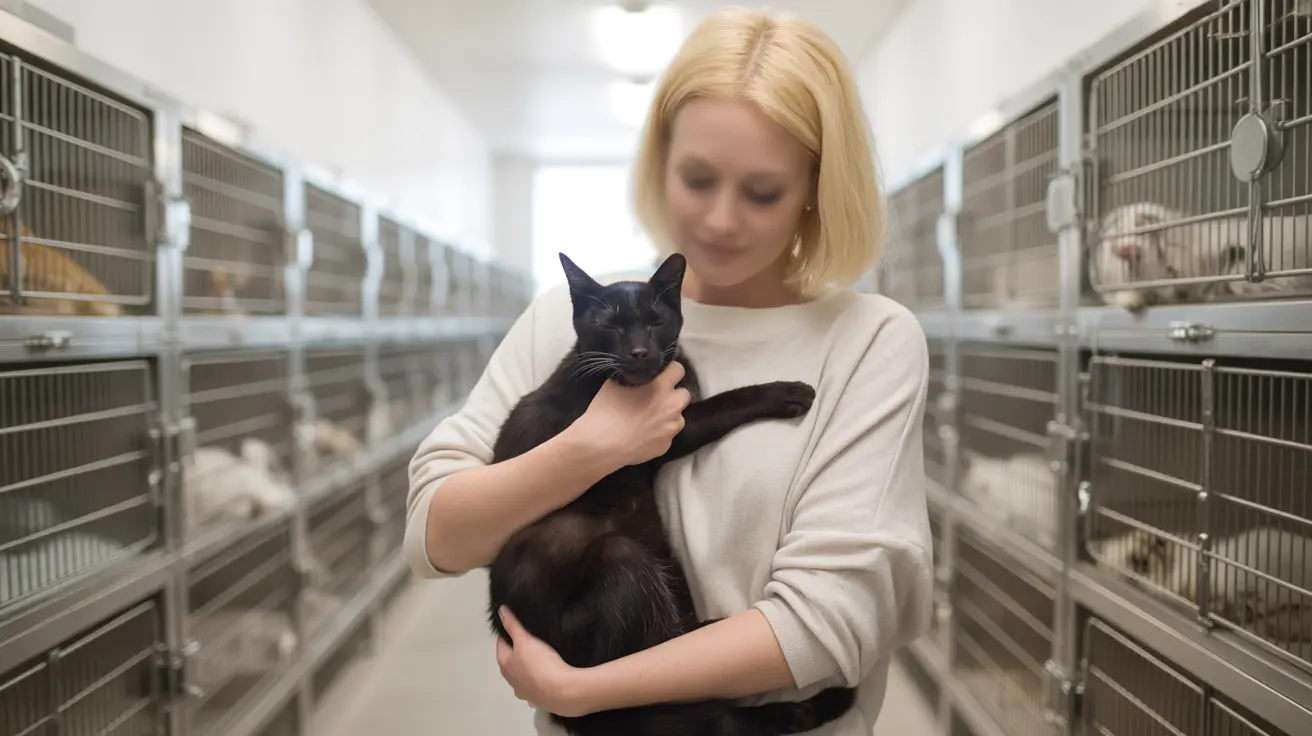How Cats Sense Pregnancy: Understanding Your Feline's Remarkable Ability to Detect Changes
Many pregnant women report that their cats seemed to "know" about their pregnancy before they did themselves. These feline companions often display unusual behaviors, becoming more affectionate, protective, or clingy around their expecting owners. While the idea that cats can sense pregnancy might sound like folklore, there's fascinating science behind how cats sense pregnancy through their extraordinary sensory abilities and acute awareness of environmental changes.
Understanding how cats detect pregnancy involves exploring their remarkable olfactory system, their sensitivity to behavioral changes, and their ability to perceive subtle shifts in their owner's routine and physical state. This knowledge can help pregnant cat owners better understand their pet's behavior and prepare for the changes ahead.
The Science Behind Cats' Extraordinary Sense of Smell
The foundation of how cats sense pregnancy lies in their incredibly sophisticated olfactory system. Cats possess approximately 200 million odor-sensitive cells in their nasal cavity, compared to humans' mere 5 million. This remarkable difference means cats can detect scents that are completely imperceptible to us, making their sense of smell about 14 times more powerful than ours.
During pregnancy, a woman's body undergoes significant hormonal changes that alter her natural scent. While there's no hard scientific evidence that cats can directly smell pregnancy hormones like hCG (human chorionic gonadotropin), their enhanced olfactory capabilities allow them to detect subtle changes in their owner's body chemistry and pheromone production that occur during early pregnancy.
These hormonal shifts create new scent profiles that cats can easily identify, even when humans remain completely unaware of these changes. This explains why many cat owners notice behavioral changes in their pets during the very early stages of pregnancy, sometimes even before they've taken a pregnancy test.
How Pregnancy Changes Affect Your Cat's Behavior
When cats detect these pregnancy-related changes, they often respond with noticeable behavioral adjustments. Many cats become significantly more affectionate during their owner's pregnancy, seeking increased physical contact through cuddling, purring, and staying close to their pregnant owner. This heightened affection may be driven by the pheromones released during pregnancy, which can make cats feel safer and more secure.
Some cats develop protective instincts, preferring to stay near their owner's belly or following them around the house more frequently than usual. Others may become more demanding of attention, seeking extra petting and interaction. However, not all cats respond the same way – some may become more distant if they detect emotional stress or anxiety in their pregnant owner.
Temperature Changes and Seeking Warmth
Pregnancy causes a slight increase in a woman's body temperature, which may explain why some cats become particularly clingy during this time. Cats are naturally drawn to warmth, and the elevated body temperature of pregnant women can make them especially appealing companions for heat-seeking felines. This physical change provides another sensory cue that cats can detect and respond to.
Environmental and Routine Changes That Cats Notice
Beyond hormonal and physical changes, pregnancy significantly alters a person's daily routine and behavior patterns. Cats are creatures of habit who pay close attention to their environment, making them highly sensitive to these modifications. Pregnancy symptoms like morning sickness, fatigue, food cravings, and changes in sleep patterns all create new behavioral patterns that cats quickly recognize.
A pregnant woman might sleep longer, eat different foods, or move more slowly due to fatigue or nausea. She may also spend more time at home or change her usual activities. These routine disruptions don't go unnoticed by observant cats, who adjust their own behavior in response to their owner's new patterns.
Additionally, as pregnancy progresses, physical changes like a growing belly and altered posture provide visual cues that cats can perceive. While cats cannot understand the concept of pregnancy intellectually, they are remarkably adept at recognizing that something significant is changing in their environment.
Managing Your Cat's Behavior During Pregnancy
Understanding how cats sense pregnancy can help expectant mothers better manage their pet's behavioral changes. If your cat becomes more affectionate or demanding, try to maintain consistent interaction while setting appropriate boundaries. Providing extra attention when possible can help satisfy your cat's increased need for closeness while managing your own energy levels during pregnancy.
For cats that become overly protective or clingy, gradually introducing independence can be helpful. Create comfortable spaces where your cat can observe you from a distance, and maintain regular play sessions to provide mental and physical stimulation.
Preparing for Baby's Arrival
To help cats adjust to the upcoming arrival of a new baby, start introducing changes gradually during pregnancy. Set up nursery equipment slowly, allowing your cat to investigate and become familiar with new furniture, toys, and baby items. Playing recordings of baby sounds at low volumes can help desensitize your cat to the noises they'll soon encounter.
Maintaining your cat's routine as much as possible throughout pregnancy and after the baby arrives will help reduce stress and behavioral issues. If feeding schedules or play times need to change, implement these adjustments gradually during pregnancy rather than suddenly after the baby's birth.
Safety Considerations for Pregnant Cat Owners
While cats can safely be around pregnant women, there are important health precautions to consider. The primary concern is toxoplasmosis, a parasitic infection transmitted through cat feces that can pose serious risks to developing fetuses. Pregnant women should avoid handling cat litter boxes whenever possible, delegating this task to another household member.
If you must clean the litter box yourself, always wear disposable gloves and wash your hands thoroughly afterward. Consider switching to a clumping litter and cleaning the box daily, as the toxoplasmosis parasite becomes infectious after 1-5 days in the litter box.
Beyond litter box safety, maintain regular veterinary care for your cat to ensure they're healthy and up-to-date on vaccinations. This protects both your cat and your growing family from potential health risks.
The Long-term Bond Between Cats and Growing Families
Many cat owners find that their pet's heightened sensitivity during pregnancy creates a stronger bond that continues after the baby arrives. Cats who become more affectionate during pregnancy often maintain this closeness with both mother and child, sometimes developing protective relationships with the new baby.
However, it's essential to supervise all interactions between cats and newborns to ensure safety for both the baby and the cat. Some cats may initially feel displaced by the new arrival, while others embrace their role as the baby's guardian. Patience and consistent positive reinforcement can help foster healthy relationships between your cat and your growing family.
Frequently Asked Questions
- Can cats actually detect pregnancy hormones?
While cats have an incredibly sensitive sense of smell with 200 million odor-sensitive cells compared to humans' 5 million, there's no hard scientific evidence that they can specifically detect pregnancy hormones like hCG. However, they can detect subtle changes in body chemistry and pheromone production that occur during pregnancy.
- Why does my cat suddenly want to sleep on my belly during pregnancy?
Cats may be drawn to your belly due to the slight increase in body temperature during pregnancy, as cats naturally seek warmth. They may also be responding to hormonal changes and pheromones that make them feel safer and more secure near you.
- Is it safe to have cats around during pregnancy?
Yes, it's generally safe to be around cats during pregnancy. The main concern is toxoplasmosis transmission through cat feces, so pregnant women should avoid cleaning litter boxes or wear gloves and wash hands thoroughly if they must handle litter box duties.
- How early in pregnancy do cats start showing behavioral changes?
Many cat owners report noticing behavioral changes in their cats during very early pregnancy, sometimes even before they've confirmed their pregnancy with a test. This is likely due to cats detecting hormonal and pheromone changes that occur in early pregnancy.
- Will my cat be jealous of the new baby?
Some cats may initially feel displaced when a new baby arrives, while others adapt well and may even become protective of the infant. Gradual preparation during pregnancy, maintaining routines, and supervised introductions can help minimize jealousy and promote positive relationships.
- Do all cats react the same way to their owner's pregnancy?
No, cats respond differently based on their individual personalities. Some become more affectionate and clingy, others show protective behaviors, and some may become more distant if they detect stress or anxiety in their pregnant owner.
- Should I be concerned if my cat's behavior changes during my pregnancy?
Behavioral changes are typically normal responses to the environmental and hormonal changes occurring during pregnancy. However, if your cat shows signs of stress, aggression, or health issues, consult with your veterinarian to ensure there are no underlying problems.
Conclusion
While cats cannot intellectually understand pregnancy, their remarkable sensory abilities and environmental awareness allow them to detect the significant changes that occur when their owner is expecting. Through their enhanced sense of smell, sensitivity to routine changes, and ability to perceive physical and emotional shifts, cats often demonstrate an uncanny ability to "sense" pregnancy before it becomes obvious to humans.
Understanding how cats sense pregnancy helps expectant mothers better interpret their pet's behavioral changes and take appropriate steps to maintain a healthy, safe environment for both their cat and their growing family. With proper precautions and gradual preparation, cats can continue to be loving, supportive companions throughout pregnancy and beyond.






